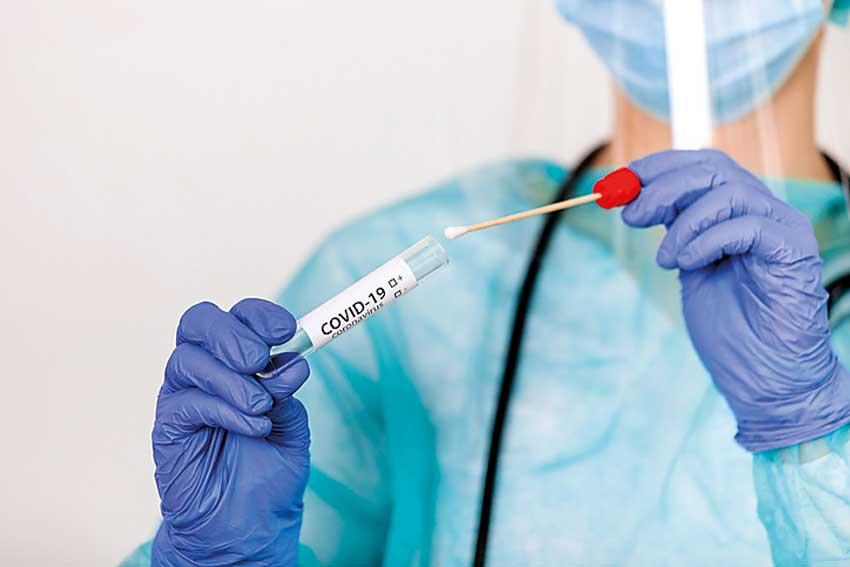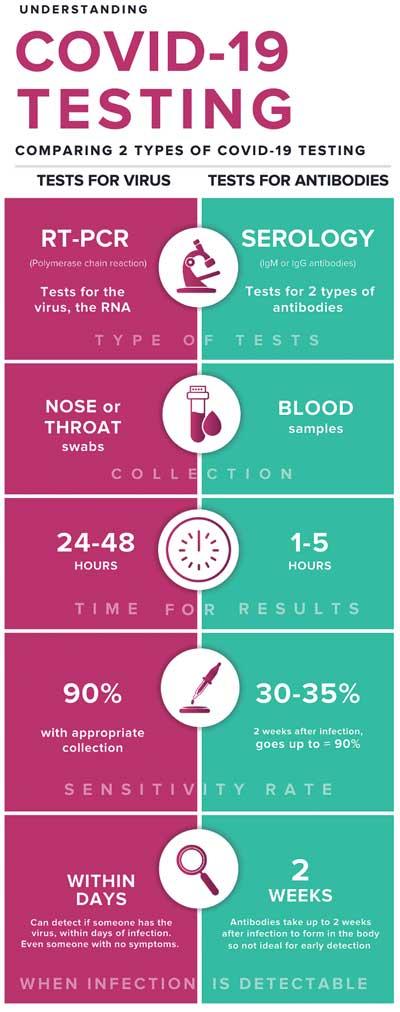27 Nov 2020 - {{hitsCtrl.values.hits}}

 COVID-19 is the most common word which can be heard these days. As per the Epidemiology Unit, over 20,508 COVID-19 cases have been confirmed. Among them 5720 patients were under medical care as at November 25. Due to this ongoing outbreak of the coronavirus, the COVID-19 PCR test has remained the most popular diagnostic test after this infection surfaced. However, other types of laboratory tests such as antigen tests and serological tests (antibody test) are being introduced to detect the COVID-19 viral infection in order to overcome some limitations in PCR tests and to obtain rapid results etc. But some people have doubts regarding the purpose and the differences between PCR, antigen and serological tests. This week’s Health Capsule focuses on the purpose, difference and limitations of these tests.
COVID-19 is the most common word which can be heard these days. As per the Epidemiology Unit, over 20,508 COVID-19 cases have been confirmed. Among them 5720 patients were under medical care as at November 25. Due to this ongoing outbreak of the coronavirus, the COVID-19 PCR test has remained the most popular diagnostic test after this infection surfaced. However, other types of laboratory tests such as antigen tests and serological tests (antibody test) are being introduced to detect the COVID-19 viral infection in order to overcome some limitations in PCR tests and to obtain rapid results etc. But some people have doubts regarding the purpose and the differences between PCR, antigen and serological tests. This week’s Health Capsule focuses on the purpose, difference and limitations of these tests.
RT- PCR Test
The PCR test has high accuracy when it is carried out between 2 and 5 days after the onset of symptoms. Because, once the virus enters the body, it takes 2-14 days for symptoms to appear (incubation period). Moreover, those who have direct exposure to COVID-19 infected persons also need to do this test. This RT- PCR test detects the presence of virus genetic materials (viral RNA) in patient samples such as oral and nasal swabs or sputum. There are several steps in the process of detecting viral genetic material by using RT- PCR tests including the isolation and purification of total RNA from the sample, elution and concentration of the material, the use of purified RNA in a reverse-transcription (RT) reaction resulting in complementary DNA (cDNA) from the template RNA which is then utilised for the RT-PCR reaction.
Limitations of RT- PCR in detection of COVID-19
1. Giving false-negative results
As some studies suggested an erroneous RT-PCR results may be caused by inappropriate sample collection, storage, transfer, purification and the quality of the RNA extracted from the swabs. In addition to that other factors such as degradation of purified RNA, the presence of RT-PCR inhibitors, or genomic mutations may cause false-negative results.
2. Giving false – positive results
Cross-contamination of samples during collection, pipetting, and processing or technical errors may cause for false-positive results.
3. Other disadvantages
RT- PCR test can be used to determine who has an active infection while it does not help to determine whether a person had an infection in the past. Moreover, it does not help determine if a person who was exposed to COVID-19 would develop active infection during the two weeks after exposure. Furthermore, in some people, the virus can only be found by a molecular test for a few days at the beginning of the infection. Therefore, the test might not reveal the virus if the swab is taken more than a few days after the illness starts. In some people, the virus can be found through a PCR test via the nose and throat after several weeks; even longer than the time that they were actually communicating with other people.
Antigen Test
The COVID-19 antigen test detects proteins in the SARA-CoV-2 virus by using a nasal and throat swab. Antigen tests can produce results in a short time. A positive antigen test reflects that the person being tested has an active COVID-19 infection. This test can be used for the rapid determination of active COVID-19 infection and to identify people who are infectious. And also antigen test is a less expensive test than a RT- PCR test which is used to detect the COVID-19 infection.
Limitations of Antigen Test
An Antigen Test does not accurately rule out those who are not infected. Antigen Tests are less sensitive than PCR Tests. Therefore, there may be false negative results. Negative tests should be treated as unconfirmed. If a healthcare provider is concerned that the person has COVID-19, even after a negative antigen test, then the test result should be confirmed with a RT- PCR test.
Serological Test
Serological tests are detecting the antibodies which are produced in response to SARS-CoV-2 in the blood stream to make a rapid diagnosis of primary (IgM-after 5 days) and secondary or past (Ig G- 5-21 days) infections of the COVID-19 virus. Moreover, an antibody test is suitable for asymptomatic patients to check whether they exposed themselves to the COVID-19 infection since it detects Ig G antibody which reflects infection in past. Furthermore, this test is suitable for the patient who exceeds 14 days of infection (since there may be have chance to getting of false negative results for PCR test after 14 days of infection)
Limitations of Antibody Tests
This test cannot be used to detect an active COVID-19 infection and has low sensitivity; specificity when compared with an RT- PCR test. Some antibody tests may cross-react with other coronaviruses that are not SARS-CoV2, the virus that causes COVID-19, leading to false test results. Even after a positive antibody test, the test result should be confirmed with an RT- PCR test.
The writer holds a MSc. Degree in Industrial and Environmental Chemistry from the University of Kelaniya and BSc. Food Production and Technology Management degree from the Wayamba University of Sri Lanka.
21 Dec 2024 4 hours ago
21 Dec 2024 5 hours ago
21 Dec 2024 8 hours ago
21 Dec 2024 8 hours ago
21 Dec 2024 9 hours ago